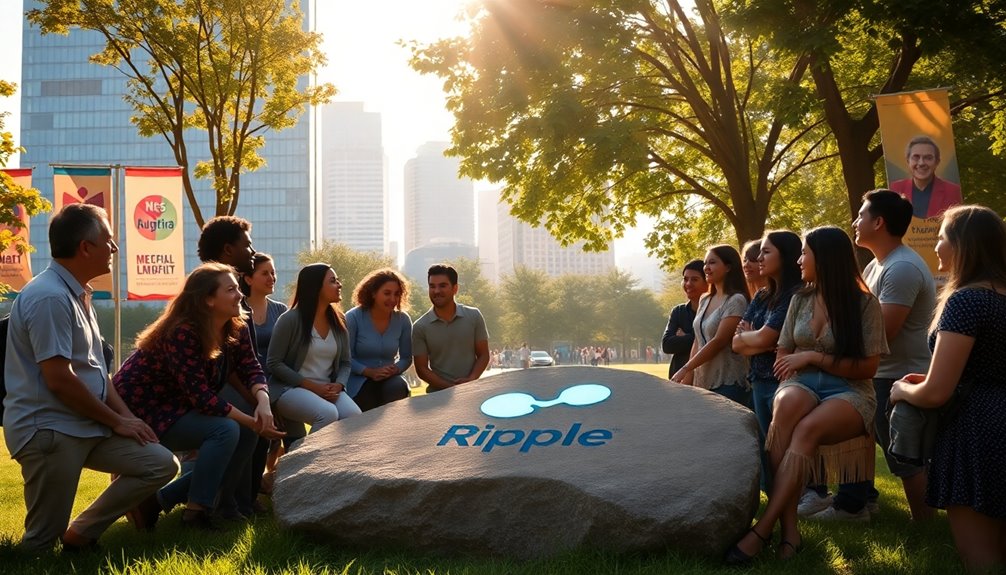Ripple's bold commitment to donate 1% of its products, profits, or time through the Pledge 1% Movement is reshaping the crypto industry's approach to social responsibility. Since 2018, the company has contributed over $180 million to various charities and humanitarian efforts, including disaster relief and education. This pledge not only promotes a culture of giving but also aligns with Ripple's sustainability goals and innovative blockchain solutions. By integrating philanthropy into its business model, Ripple sets a new standard for other crypto companies. Stay with us to uncover how this initiative influences the future of crypto and philanthropy.
Key Takeaways
- Ripple has joined the Pledge 1% Movement, committing 1% of its products, profits, or time to charitable causes globally.
- The company has donated over $180 million since 2018, demonstrating its dedication to philanthropy and social responsibility.
- Ripple's initiatives, such as employee donation matching and cryptocurrency donations, encourage community engagement and innovative giving methods.
- The partnership with organizations like the International Rescue Committee illustrates Ripple's commitment to humanitarian aid during global crises.
- Ripple's focus on transparency and measuring impact sets a precedent for integrating ethical practices within the cryptocurrency industry.
Ripple Joins Pledge 1% Movement

Ripple's recent decision to join the Pledge 1% Movement marks a significant commitment to philanthropy. By aligning with this global initiative, Ripple joins over 18,000 companies across more than 130 countries, all pledging to donate 1% of their products, profits, or time to charitable causes.
This movement has already led to billions of dollars in new philanthropy over the last decade, proving its impact on the corporate landscape. Approximately 18,000 companies have been involved in this initiative, showcasing the widespread adoption of corporate social responsibility. Additionally, Ripple's commitment to social good mirrors the environmentally sustainable practices that many companies are adopting.
Since 2018, Ripple has demonstrated its dedication to giving back by donating over $180 million globally. Recent contributions include $1 million to the International Rescue Committee and $100,000 for flood relief in Brazil. Additionally, Ripple has acquired 182,000 metric tons of carbon credits to support environmental sustainability. Ripple's commitment to improving carbon credit trading transparency illustrates its focus on innovative solutions for sustainable practices.
In addition, Ripple's support for humanitarian efforts extends to earthquake relief in Turkey and Syria, showcasing its commitment to various global challenges.
Ripple's participation in the Pledge 1% Movement not only strengthens its philanthropic profile but also encourages a culture of giving within the company.
With initiatives like donation matching for employees, Ripple fosters engagement and empowers its workforce to contribute to meaningful causes.
Commitment to Social Impact

Joining the Pledge 1% Movement has amplified Ripple's commitment to social impact, reflecting a thorough approach to corporate responsibility.
You'll see this through their partnerships with NGOs like Mercy Corps Ventures, where Ripple invests in over 50 fintech startups, securing $500 million in follow-on funding. These initiatives spread across 23 countries, integrating people in emerging markets into the global digital economy and aiding smallholder farmers, unemployed youth, and entrepreneurs. Ripple's participation in the Pledge 1% Movement exemplifies their dedication to leveraging business success for social good.
Ripple also prioritizes humanitarian aid, providing rapid-response funding to organizations like UNHCR and donating $1 million for earthquake relief in Turkey and Syria. Their commitment to humanitarian initiatives has seen them collaborate with the International Rescue Committee to enhance aid delivery effectiveness. In alignment with their mission, Ripple's efforts contribute to a broader global movement that seeks to create positive change through business practices.
Their employee donation matching program encourages a culture of giving, with a 200% match during crises. Additionally, they collaborate with the International Rescue Committee to pilot blockchain payment solutions for aid delivery, using RLUSD stablecoin for speed and traceability.
On a local level, Ripple engages employees through volunteer events and partnerships with nonprofits, including the Eat. Learn. Play. Foundation.
With a $100 million pledge to support sustainability, you can see that Ripple's commitment to social impact isn't just a promise; it's a thorough strategy that drives meaningful change across various sectors.
Advancing Blockchain Innovation

Advancing blockchain innovation takes center stage as Ripple leverages strategic partnerships and groundbreaking research initiatives. Through the University Blockchain Research Initiative (UBRI), Ripple partners with 29 universities worldwide, including the prestigious Haas School of Business. This initiative funds new research projects, courses, and incubators, ultimately aiming to catalyze blockchain innovation and education. Additionally, Ripple's $50 million grant to support universities reflects its commitment to fostering innovation and research in blockchain applications.
Here's what you can expect from Ripple's efforts:
- Supports faculty and graduate student research to drive new ideas.
- Enhances scalability with parallel processing capabilities for multiple transactions.
- Utilizes the Ripple Protocol Consensus Algorithm for fast and secure processing.
- Facilitates real-world applications in cross-border payments and financial services.
- Improves efficiency and resilience in emerging markets through innovative solutions. Additionally, Ripple's approach to regulatory compliance emphasizes its commitment to integrating blockchain into traditional financial systems. Furthermore, Ripple's architecture allows for 3,400 transactions per second, demonstrating its robust capacity to handle high transaction volumes. Moreover, Ripple aims to diversify crypto assets within its initiatives to mitigate risks associated with market volatility.
These initiatives not only bolster Ripple's mission but also contribute greatly to the broader blockchain ecosystem. By fostering education and innovation, Ripple positions itself as a leader in transforming how we think about and utilize blockchain technology.
As you witness these advancements, you'll see how they shape the future of finance, making transactions faster, more efficient, and more accessible for everyone.
Humanitarian Aid Initiatives

Transforming humanitarian aid through innovative technology can greatly enhance the lives of those in need. Ripple Labs has partnered with the International Rescue Committee (IRC) to commit $1 million annually, focusing on improving the distribution of charitable aid through blockchain technology.
By testing its RLUSD stablecoin, Ripple aims to streamline cash relief programs and international fund transfers, ensuring that vulnerable communities can access essential resources more quickly. Utilizing Ripple's XRP Ledger, the collaboration intends to enhance the speed and reliability of cash relief efforts. It optimizes crypto-to-fiat conversions, boosting liquidity for aid operations while reducing costs and streamlining the delivery process.
The IRC, active in over 40 countries and having already distributed more than $70 million in cash and vouchers, will leverage Ripple's global payments network to transform aid distribution at scale. In this partnership, Ripple's commitment to humanitarian initiatives signifies a pivotal move towards utilizing blockchain for effective aid distribution. Furthermore, this initiative aligns with Ripple's focus on financial inclusion to ensure that aid reaches those who need it most efficiently.
This partnership not only showcases Ripple's commitment to humanitarian efforts but also reinforces its history of supporting organizations through its Impact program. Additionally, the collaboration aims to address the urgent needs of the 360 million people in need of aid amid global crises.
Sustainability and Climate Action

As the urgency of climate action intensifies, Ripple is stepping up its efforts to promote sustainability within the blockchain space.
With its Ripple Protocol Consensus Algorithm (RPCA), Ripple drastically reduces energy consumption compared to traditional Proof of Work systems. The XRP Ledger consumes only about 0.0005361 TWh of electricity each year, making it one of the most sustainable cryptocurrencies available. Additionally, Ripple is committed to achieving carbon net-zero emissions by 2030 or sooner, underscoring its dedication to environmental responsibility. This commitment is supported by the understanding that sustainability encompasses multiple dimensions, including economic and social factors. Ripple's energy-efficient approach is highlighted by the fact that transactions consume about 0.0079 kWh, significantly lower than Bitcoin.
Ripple's commitment to carbon neutrality by 2030 is also significant. They invest in carbon offset projects and support carbon-neutral initiatives, allocating $100 million to improve carbon credit trading.
Here are some key initiatives Ripple is undertaking:
- Investing in startups focused on green blockchain solutions.
- Collaborating with academic institutions to promote sustainable technologies.
- Supporting the Crypto Climate Accord for industry-wide decarbonization.
- Funding innovative projects like CarbonCure to enhance carbon capture.
- Partnering with companies for reforestation and renewable energy efforts.
Employee Engagement Programs

Ripple actively fosters a culture of employee engagement through innovative programs that encourage participation in social impact initiatives. With an impressive 78% of employees involved in these initiatives, you'll find these rates far exceed the average of 17%. Ripple's commitment to corporate social responsibility reflects the company's ethos, inspiring employees to contribute meaningfully to their communities.
Ripple allows you to engage in various causes, whether it's through hackathons, cultural month fundraising, or local volunteering. This decentralized approach means you can contribute in ways that resonate with you personally. Additionally, Ripple offers customizable team building activities designed to enhance communication and collaboration among employees. Engaging in these activities can also promote emotional expression among team members, fostering a supportive workplace environment. The emphasis on self-improvement aligns with the broader trend of personal development, encouraging employees to grow both personally and professionally. Developing skills in financial literacy can empower employees to make informed decisions about their personal finances, while participating in educational toys can enhance cognitive and emotional growth in both children and adults.
Employee recognition plays a key role in boosting your morale and engagement. Automated notifications for milestones, like work anniversaries, help managers connect with you, showing that the organization values your contributions. This focus on recognition boosts engagement significantly enhances overall morale and strengthens workplace culture.
Additionally, Ripple offers career development opportunities, enhancing both your skills and loyalty to the company.
Onboarding is another critical focus, ensuring new hires feel welcomed and integrated into the culture. Automated processes streamline essential tasks, contributing to a smooth changeover.
Ripple's commitment to open communication and regular engagement surveys helps shape a thriving workplace, allowing you to provide feedback and influence your environment actively.
With community-building tools, you can easily participate in volunteering and fundraising efforts, making a tangible impact.
Ripple's Financial Contributions

While many companies focus solely on profits, Ripple stands out with its substantial financial contributions aimed at social good. In 2024 alone, Ripple's political contributions reached nearly $25 million, with significant amounts directed to organizations like Fairshake PAC.
Additionally, Ripple has committed over $170 million to various nonprofits, showing a deep commitment to philanthropy.
Here's a closer look at Ripple's financial contributions:
- $190,000 spent on lobbying efforts in 2024, reflecting their strategic influence in the industry.
- $1.1 million allocated to COVID-19 relief funds, showcasing their responsiveness during crises.
- $50,000 matching fund for the Maui Emergency Response Fund, emphasizing their commitment to local initiatives.
- $80 million dedicated to the University Blockchain Research Initiative, supporting educational advancements. Ripple's financial engagement aligns with the increasing trend of Bitcoin IRA investments that emphasize social responsibility. Investments in precious metals can also serve as a hedge against inflation, further demonstrating Ripple's understanding of diverse financial strategies. The importance of budgeting is evident in Ripple's approach to ensuring that their contributions do not compromise their operational sustainability. Furthermore, Ripple has explored integrating state-specific benefits into their philanthropic strategy to maximize impact in different regions.
- 1% of profits pledged for social impact, highlighting their ongoing commitment to responsible business practices.
Moreover, Ripple's XRP donations through The Giving Block have engaged cryptocurrency holders in philanthropy, further amplifying their social responsibility efforts. Ripple's commitment to social initiatives through the Pledge 1% partnership signifies its dedication to integrating social impact within its business model.
In addition to these efforts, Ripple's political contributions reflect a broader trend of engaging with organizations that prioritize social impact, which could lead to increased institutional support in the future.
These contributions not only bolster Ripple's reputation but also set a precedent in the crypto space, demonstrating that profitability and social responsibility can coexist.
Partnerships and Collaborations

Through strategic partnerships and collaborations, Ripple's influence in the blockchain space is expanding rapidly. By working with various governments, universities, and exchanges, Ripple is positioning itself as a leader in innovative digital finance solutions. These partnerships not only enhance Ripple's technological capabilities but also promote the adoption of blockchain globally. Notably, Ripple's collaboration with the Central Bank of Montenegro aims to modernize monetary policy and improve financial inclusion. This initiative is part of Ripple's broader commitment to support developers in creating blockchain solutions in the region. Additionally, Ripple's partnership with the University Blockchain Research Initiative fosters academic research that directly benefits the blockchain industry.
Here's a snapshot of some key collaborations:
| Partnership Type | Key Collaborations | Focus Areas |
|---|---|---|
| Government Partnerships | Bhutan, Palau, Montenegro, Georgia, Colombia | CBDCs, digital payments, inclusion |
| Blockchain Innovation | DIFC Innovation Hub, 1B XRP Fund | Development, regional adoption |
| University Collaborations | UBRI with Penn, Cornell | Research, cross-disciplinary work |
| Exchange Partnerships | Uphold, Bitstamp, Bitso, MoonPay | RLUSD stablecoin, liquidity |
These collaborations reflect Ripple's commitment to fostering innovation and creating a more inclusive financial system. By engaging with various sectors, Ripple not only drives technological advancements but also addresses critical issues like environmental sustainability and regulatory compliance.
Building an Inclusive Financial System

The rapid expansion of partnerships and collaborations has set the stage for building a more inclusive financial system. By focusing on remittances, savings, and micropayments, Ripple aims to transform access to financial services, especially for the un- and under-banked populations globally. Additionally, Ripple's goal is to improve access to digital financial services for 100 million individuals by 2030.
Through initiatives like the "Unlocking Opportunity" program, Ripple provides grants to businesses in emerging markets, fostering economic growth and innovation. Research indicates that fostering self-regulation in these populations can enhance their financial decision-making skills. Furthermore, establishing a power of attorney can empower individuals to make informed financial choices for themselves and their families. Notably, the use of natural language processing (NLP) can also help improve customer interactions, driving engagement and support for these underrepresented groups.
Here's how Ripple is making a difference:
- Grants of up to $100,000 support local businesses, boosting economies.
- Over $5.5 million committed to nearly 50 startups, with a focus on female co-founders.
- Utilizing the XRP Ledger and RLUSD stablecoin to enhance fintech solutions.
- Collaborating with academic institutions, investing $80 million in blockchain research.
- Enhancing humanitarian aid delivery with blockchain-based payment solutions. Ripple's funding strategy
Additionally, Ripple has committed 1% of profits towards social causes, further solidifying its dedication to community welfare and economic accessibility.
These efforts not only improve access to financial services but also create a more equitable financial landscape.
By measuring the number of individuals newly "banked," Ripple keeps track of its impact, ensuring that everyone can participate in the global economy.
You're witnessing a shift towards a more inclusive financial ecosystem that prioritizes access and affordability for all.
The Future of Crypto Philanthropy

Crypto philanthropy is poised for a transformative future, driven by the recovery of the cryptocurrency market and increased institutional adoption. As the market stabilizes, with Bitcoin surpassing $90,000, you'll notice a growing donor pool fueled by institutional investments and the rise of cryptocurrency ETFs. This growing acceptance of digital assets among traditional financial institutions further legitimizes crypto donations in the eyes of potential donors. Additionally, the historical price volatility of Bitcoin often leads to significant price jumps, which can create larger opportunities for donations.
This environment attracts tech-savvy individuals, particularly from Gen Z and Millennials, who are more inclined to make substantial donations. You'll also benefit from understanding the tax advantages of donating appreciated cryptocurrencies, which can help you avoid capital gains taxes while still receiving deductions. Educating potential donors about these benefits can encourage larger contributions. Moreover, as of January 2024, 56% of top US charities accept crypto donations, making it increasingly vital for nonprofits to adapt.
Nonprofits need to prepare for this shift; partnering with platforms like The Giving Block guarantees secure transactions and builds trust within the crypto community. To engage this new demographic effectively, you should promote crypto giving options across all fundraising channels and enhance your website's user experience for crypto donations.
As younger generations take the financial reins, adapting your strategy to their preferences will be critical. By embracing these changes, you can harness the full potential of crypto philanthropy and create meaningful impact in the charitable sector.
Frequently Asked Questions
How Does Ripple Select the Initiatives It Supports?
Ripple selects initiatives based on their alignment with its mission to advance blockchain innovation and improve financial access.
You'll see a focus on partnerships that enhance impact, like collaborations with nonprofits and academic institutions. They prioritize projects that support emerging markets and promote financial inclusion, particularly for unbanked communities.
Employee-driven initiatives also play a key role, empowering staff to engage with local projects and fostering a culture of community support.
What Metrics Does Ripple Use to Measure Impact?
To measure impact, Ripple employs the Triple Bottom Line (TBL) approach, focusing on people, planet, and profit.
You'll see metrics like carbon footprint, employee satisfaction, and community engagement. They also assess social return on investment (SROI), integrating qualitative insights from stakeholders.
Surveys and consultations help collect data, ensuring a well-rounded evaluation of financial returns alongside social and environmental benefits.
This holistic approach promotes meaningful change and sustainability in their initiatives.
Can Individuals Contribute to Ripple's Social Initiatives?
Yes, you can definitely contribute to Ripple's social initiatives!
You can donate directly using XRP or fiat currency, and your contributions can be matched by Ripple's donation matching program.
You can also volunteer for various projects, participate in fundraising events, and spread awareness on social media.
Engaging with local nonprofits and joining hackathons are great ways to get involved and support Ripple's commitment to social impact and community development.
How Does Ripple Engage Employees in Decision-Making?
Ever wondered how a company truly engages employees in decision-making?
At Ripple, you're encouraged to voice your ideas and insights, fostering a culture of open communication.
You'll find that your contributions matter, as leaders actively listen and provide feedback.
This collaboration helps align individual goals with the organization's objectives, making you feel empowered and motivated.
What Are Ripple's Future Philanthropic Goals Beyond 1%?
Ripple's future philanthropic goals focus on enhancing financial inclusion, supporting sustainable initiatives, and advancing blockchain education.
You'll see them investing in emerging markets, partnering with NGOs to improve access to financial services, and scaling carbon markets.
They're also committed to employee-driven community engagement, encouraging staff to volunteer and contribute financially.
Conclusion
In committing to the Pledge 1% movement, Ripple isn't just throwing money at problems; it's igniting a movement that could redefine crypto's role in society. You might think big companies only care about profits, but Ripple shows that's not the case. By prioritizing social impact alongside innovation, it's paving the way for a more inclusive financial system. So, let's embrace this shift—together, we can create a crypto landscape that values both profit and purpose.











